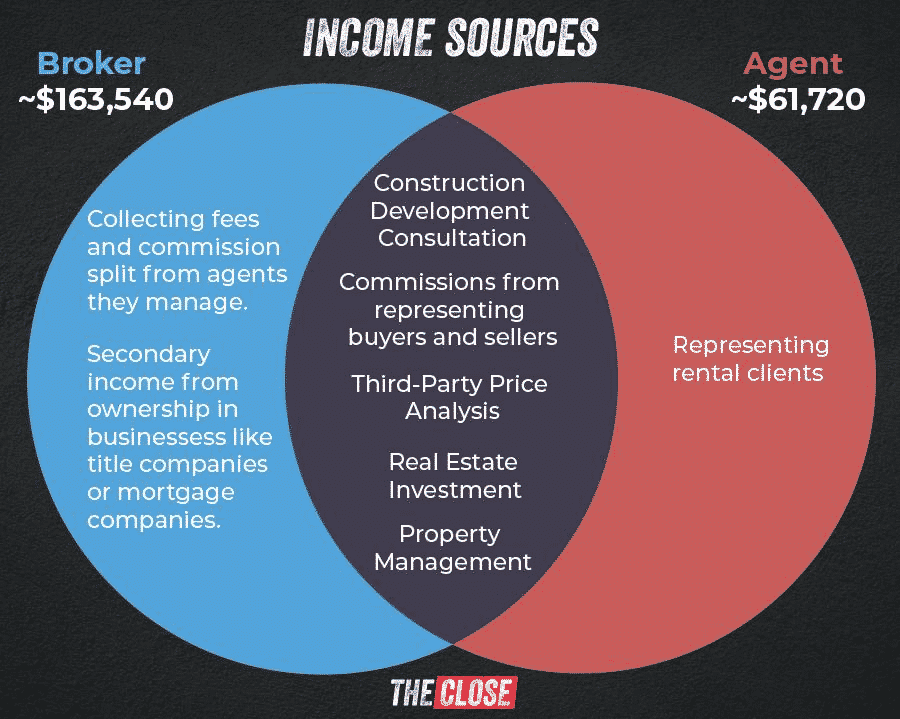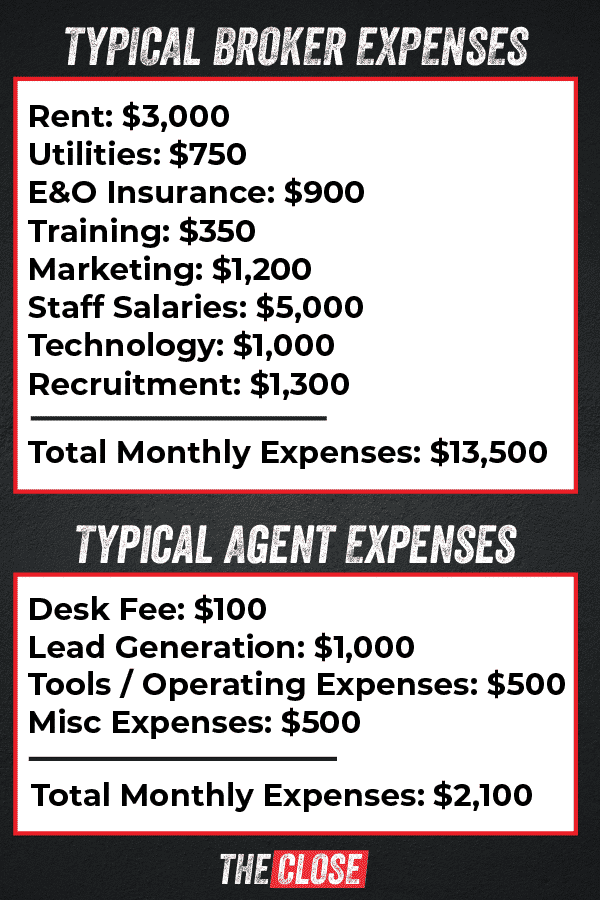What’s the difference between a real estate broker and an agent? Think of a broker as a leveled-up agent. They can open their own brokerage, manage agents and collect fees, and service their own clients. An agent can perform real estate tasks for their clients, but only while under the supervision of a broker.
Being a broker comes with perks but also a lot of responsibility. This article will break down the differences between real estate agents and real estate brokers and what they do day-to-day. You’ll get everything from their annual income to a detailed job description.
If you’re looking to level up from agent to broker or need some quick answers about the differences between agents and brokers, read on.
Real Estate Broker vs Agent Salary
Neither a real estate agent nor a real estate broker earns a salary. Instead, they get paid on a commission-only basis. Here’s a breakdown of how brokers and agents are paid, how much real estate agents and real estate brokers make, and how we obtained those numbers.
Real Estate Broker vs Agent Salary: Where the Money Comes From
According to the United States Bureau of Labor and Statistics (BLS), in 2019, the average annual income for a real estate broker was $163,540. The average real estate agent income was $61,720. Where does this money come from, if not from a salary? Here’s a breakdown of the different ways agents and brokers earn their cash.

Real Estate Agent Salary: A Closer Look
The majority of a real estate agent’s income comes from commissions earned while representing buyers and sellers in real estate transactions. If an agent represents both parties in a sale (often called “double-dipping”), they earn the entire commission, typically between 5 and 6% of the final sale price.
Of course, if another agent is representing the other party in a sales transaction—whether they are the buyer or seller—that 5 or 6% commission is split between the two real estate agents. As such, typical gross earnings or commission for each agent runs between 2.5 and 3% of the closing sale price.
However, that money doesn’t just slide into an agent’s bank account. Agents have expenses to pay. Here’s a breakdown of what a typical commission looks like for the sale of a $250,000 home.
Real Estate Agent Commission Breakdown
| $250,000 Sale Price x 6% Commission | $15,000 (Total Commission) |
| $15,000 Divided Between Two Agents | $7,500 (Gross Individual Agent Commission) |
| $7,500 - 30% Broker Split | $5,250 (Commission After Split) |
| $5,250 - 25% Reinvestment Back Into Business | $3,938 (Gross Income) |
| $3,675 - 30% Taxes | $2,756 (Net Income) |
If you closed 15 sales a year—an average sales performance for agents in most markets—you’d have a gross income (before tax deductions) of $78,750 in that year. Your resulting take-home pay or net income would be $33,075 in that year. Of course, your numbers will differ based on your market, split, and other factors.
Real Estate Broker Salary
On the other hand, a real estate broker relies on the commissions their agents make to get paid. As you might imagine, that means brokers have a vested interest in hiring successful agents who will close deals regularly. They also pay for training because their income grows as the income of their agents does.
Here’s an example of a typical broker’s monthly income and how it breaks down by category. We’ll assume they’re leading a brokerage with 15 well-performing agents and that they have a stake in another real estate-related company, like a title company.
Can You Be a Part-time Real Estate Agent?
Broker Monthly Revenue
| Broker Represented Closed Sale | $250,000 x 3% = $7,500 |
| 1 Closed Sale From Each Agent | $250,000 x 3% = $7,500 x 30% = $2,250 x 15 = $33,750 |
| Desk Fee From Each Agent | $50 x 15 = $750 |
| Title Company Revenue | $2,000 |
| Total Monthly Revenue | $44,000 |
Now, let’s look a little closer at each of these categories and understand better how they contribute to a broker’s bottom line.
Your Own Transactions
As a broker, you’re a licensed real estate agent and are free to pursue clients the same way as the other agents at your firm. The difference is that you don’t have any brokerage fees to pay at the close of any sale since you’re the broker.
Agent Commissions
For a real estate agent to do business, they have to work for a broker. When a broker hires an agent, they negotiate two numbers: a split and a cap. The split is a percentage―or, in some cases, a flat fee―that the broker takes from the proceeds of every sale. The cap is the maximum amount an agent will pay to a broker within a calendar year.
Let’s say a broker hires an agent with a $20,000 cap and a 70/30 split. For every sale that an agent closes, their broker earns 30% of the agent’s commission—up to $20,000 in total for the year.
Once that agent has paid the broker a total of $20,000 from their commissions within a calendar year, they have “capped,” and the broker no longer makes money on the rest of the sales the agent successfully closes for the balance of the calendar year.
If you take this information and multiply it by the number of agents working for a brokerage, you can see the potential income is high.
Desk Fees
However, the split isn’t the only way that brokers earn money. Some brokers charge agents a “desk fee” or monthly fee for being a member of the team, whether they are closing transactions or not. Most brokers earmark this income as a source for paying regular, ongoing expenses.
Secondary Income
Finally, brokers often develop ownership stakes or at least complementary interests with other real estate-related service providers, and these relationships can lead to extra income.
For instance, it’s not uncommon for brokers to either start or purchase an ownership stake in a title company. The title company is a required part of closing a real estate transaction in most states, so generating income through title company ownership makes sense.
Real Estate Broker vs Agent Expenses: Who Is Paying for What?
Although it seems like a real estate broker’s income is relatively high compared to a real estate agent, remember that their operating costs are very high. Unlike a real estate agent, who only has to invest back in their own business, real estate brokers need to invest in everyone’s business to succeed.
Here’s a breakdown of the expenses of a real estate broker vs agent for a typical month operating in a mid-sized market:

As a real estate agent, you’ll need to have a cushion to deal with lean months or unexpected problems. Both brokers and agents should plan on setting aside 20 to 25% of their profits each month to build this buffer.
Also, remember that as a real estate broker, you’re responsible for operating a business that will support your agents and staff, so you’ll need to set aside cash in the bank to deal with revenue fluctuations and other unforeseen circumstances.
Keep in mind that this is a highly simplified view of the income and expenses for a real estate brokerage and individual agent. Each business is unique and may factor in things like staffing turnover, seasonality, and cost fluctuations based on the business size.
These are just a few examples to consider, so make sure you’re crafting a comprehensive real estate business plan that will account for all the specifics of your market.
Becoming a Real Estate Broker vs Agent
Becoming a real estate agent or broker requires classes, testing, and certification by the state in which you’re doing business. Every state’s requirements for each are somewhat different.
An excellent online real estate education company like Real Estate Express can give you all the details for your state, as well as set you up with convenient online classes you can use to knock out those pretest requirements from your living room.
The Close is offering our readers 25% off their package with Real Estate Express for a limited time. At checkout, enter the coupon code “TheClose25” to save some bucks on us.
Becoming a Real Estate Agent
A college degree is not required, nor do you need a business background. In fact, in most states, the only requirements are that you:
- Are 18 years of age or older
- Are legally allowed to work in the U.S.
- Have no pending criminal indictments against you
- Have no criminal convictions for violent crime or home invasion-related offenses
If you pass muster on this list, you can become a real estate agent. However, there’s more than just a form and a fee required to get a real estate license.
First, you need to take your real estate prelicensure class. The length of your course varies by state, so check with your state’s licensing and regulatory affairs commission to determine how many class hours you’ll need.
Below is a table outlining the prelicensure class hours required in five different states across the country.
Real Estate Prelicense Class Requirements
| State | Prelicense Class Length |
|---|---|
| California | 135 hours |
| Texas | 180 hours |
| Florida | 63 hours |
| New York | 75 hours |
| Illinois* | 90 hours* |
*All real estate professionals in Illinois are considered brokers, so this hourly total is for the broker’s prelicense requirements.
After you complete your real estate classes, you’ll need to pass your state’s licensing exam. It covers topics like real estate law, basic contracts, fair housing statutes, and other proficiencies you’ll need to gain if you want to be a successful real estate agent.
The test is challenging but definitely passable, especially if you do some test prep. In addition to offering online prelicense classes, Real Estate Express also offers exam prep courses that are very helpful. If you’re a nervous test taker, check out one of their real estate exam prep courses.
Finally, once you’ve passed your test, the only things left to do before you are a full-fledged real estate agent are joining a brokerage and registering in the state where you plan to practice.
All agents are required to work for a brokerage. Legally, a broker’s job is to supervise, monitor, and ultimately be responsible for the activities of the agents within their offices to make sure they’re adhering to local, state, and national real estate law.
Your brokerage will help you register with the state as a fully licensed real estate agent. Some licensing fees apply, and these vary by state. In some states, you’ll need to undergo a background check. For a deeper dive into becoming a real estate agent, check out our comprehensive guide, “How to Get a Real Estate License in 5 Easy Steps.”
Becoming a Real Estate Broker
To become a real estate broker, you must first be a real estate agent. Every state requires differing amounts of experience as a real estate agent before you can apply for a broker’s license.
Here’s a table outlining the experience requirements in five different states across the country.
| State | Experience Requirement |
|---|---|
| California | 2 full years within the last 5 years |
| Texas | 4 full years in the last 5 years |
| Florida | 2 full years within the last 5 years |
| New York | 2 years + a minimum of 14 transactions* |
| Michigan | 3 years |
*New York requires a certain level of transactional experience to apply for a broker’s license. Read more about it on the New York broker’s license application.
Once you’ve got the minimum number of years of experience to become a broker, it’ll be time to start pursuing your broker prelicense education. Just like working toward your salesperson’s license, a broker’s license requires a set of classes that cover topics relevant to running a brokerage.
The broker’s prelicense class goes into topics you’ll need to be competent in to run a real estate business. Topics include brokerage operations, investments, construction and development, property management, and business law, just to name a few.
Brokerage prelicense class lengths also vary by state. Here’s a list of those same five states with their various class lengths.
| State | Broker Prelicense Class Length |
|---|---|
| California | 45 hours |
| Texas | 270 hours |
| Florida | 72 hours |
| New York | 45 hours |
| Michigan | 90 hours |
After finishing your broker prelicense class, you’ll schedule your state exam. Brokers we know have reported that the broker’s license exam is considerably more difficult than the salesperson’s license exam. That makes sense since, as a broker, you’re expected to be a resource for the agents who work for you. The expectation is that you’ll be knowledgeable and prepared to answer their questions.
After passing your real estate broker’s exam and submitting your application for approval, all that’s left is to wait for the state to issue your license. While you’re waiting, it’s a good time to finalize your plans for starting your own brokerage, if that’s what you hope to do.
Traits of a Successful Real Estate Broker vs Agent
OK, so say you’re a real estate agent looking to join a brokerage. What are the traits you should be looking for in a great broker? Likewise, say you are a broker looking to hire agents for your firm. What are the qualities you should be seeking in your agent recruitment?
Here’s a little breakdown of the three most important traits in both.
The Ideal Real Estate Agent
If you’re looking for real estate agents to join your brokerage, there are a few traits you should be looking for in your recruitment efforts.
Productive
First, you want that person to be productive or, at least, on their way to being productive. Every agent you have on your team who doesn’t hit their cap every year is an agent who is not fulfilling their potential.
It’s relatively easy to figure out your overhead costs for each agent who is a member of your brokerage team. These costs include the amount you spend on marketing, technology, desk space, insurance, and so on.
If your agents aren’t meeting that amount and making a return on your investment in them, they may not be the best choice—or they may simply require more guidance, coaching, and support.
Good Brokerage Representative
Secondly, recruits need to represent the attitudes, ideals, and goals of the brokerage at large. It doesn’t matter how much you spend on marketing to establish your brand if your agents tell a different story.
The public will always go with what they hear and see from the street level. Perception is reality, and your brand value is only as good as how the public perceives your brand.
If it’s your goal to build a brokerage around high-end luxury clients, but you’ve hired agents who will take any listing on any street for any price, you’re going to have a hard time achieving your goal.
Good Internal Fit
Finally, you want agents who lift the morale, character, and confidence of the brokerage. A real estate brokerage is an interesting work environment in that an agent’s closest colleagues also happen to be their closest competitors as well.
Bringing an agent into your office environment who has a toxic effect on morale and interoffice life isn’t just unpleasant―it’s also unprofitable. Other agents on your team won’t perform as well, and eventually, they’ll start to look elsewhere for a more positive work environment that doesn’t feel so tainted.
The Ideal Real Estate Broker
In the same way that certain traits make for a great agent hire, there will be important traits to look for in a real estate broker. Here are the three most important things your next real estate broker needs to be.
Strong Mentor
Your broker is an important voice of knowledge and advice for questions that arise in your real estate career. Having a broker willing to share their expertise and invest in your career will dramatically flatten out your learning curve. Having a mentor and guide will quickly help you get to a place of profitability and growth.
Brokers who look at themselves as competitors to their agents and keep all the best practices to themselves tend to foster adversarial brokerages that won’t break through to the next level.
A Keen Businessperson
Operating a real estate brokerage can be a complex and sophisticated task. As a real estate agent, you depend on the stability of the brokerage to build your own business. A broker with a firm grasp of the numbers and what sustainable growth looks like is very important.
A broker with a keen business sense also recognizes the need to re-invest in the business. They demonstrate this by plugging a portion of profits from the business back into the company’s bloodstream. Reinvestment may include new technology, lead generation, or marketing—items likely to benefit every agent and not just the brokerages.
An Ambitious Goal Setter
Companies that set goals are companies that grow. Brokers who help their agents to set goals are likely to see their agents succeed year over year.
Brokers who model goal setting from the top-down help to create an environment where success isn’t just achieved—it is expected. A great broker is vocal and public about personal, agent, and company goals and is relentless in helping their team pursue and achieve them.
Bringing It All Together
Both real estate brokers and real estate agents play critical roles in the real estate industry. Are you a broker? Tell us what is crucial to the success of your brokerage.
Are you an agent? We’d love to hear what things your broker does for you to empower you to meet your goals. Leave us a comment below. Let’s get a conversation going.







